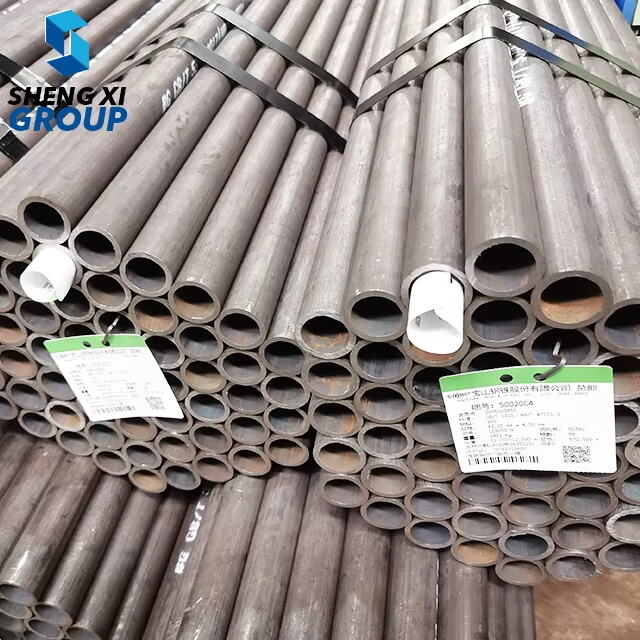Bearing Steel in Automotive Manufacturing
Critical Role in Engine Components
The quality of bearing steel makes all the difference when it comes to how long engine parts last and how reliable they are, especially for things like crankshafts and camshafts inside combustion engines. Engine builders need materials that hold up under intense heat and pressure conditions, which is exactly what good bearing steel does so well. When manufacturers choose top grade bearing steel for their components, those parts tend to last much longer than cheaper alternatives. Industry research indicates cars equipped with properly selected bearing steel actually run about 10 percent better on fuel economy compared to standard models. This isn't just about saving money at the pump either. Better material choices directly affect how green a vehicle really is over its entire lifecycle, making smart material decisions essential for both performance and environmental responsibility in modern car manufacturing.
Enhancing Transmission System Efficiency
When bearing steel gets incorporated into transmission systems, it really boosts how efficiently power moves through the system. The result? Smoother gear shifts and less wasted energy during operation. What makes this material so valuable for transmissions is its ability to withstand repeated stress without breaking down, which keeps these complex mechanisms running reliably year after year. Choosing the right type of bearing steel matters a lot too. Some research indicates that getting this choice right could extend transmission life by around 15%, though results vary depending on usage conditions. We see these benefits play out daily across countless vehicles on our roads today. Transmission components subjected to constant punishment from city driving to highway cruising simply last longer when made with quality bearing steel. For car makers looking to build durable yet responsive vehicles, incorporating this material represents one of those smart engineering decisions that pays off both in terms of reliability and customer satisfaction.
Aerospace Applications of Bearing Steel
Aircraft Engine Performance
The right kind of bearing steel makes all the difference when it comes to getting the most out of aircraft engines. Basically, these materials cut down on friction inside the engine components, which means planes burn less fuel during flights. Less friction translates into real money saved over time for airline operators since running an aircraft isn't cheap business. Different types of bearing steel get put through their paces in lab tests before they're approved for use in jet engines where temperatures can hit extreme levels. Most engineers will tell anyone who asks that choosing bearing steel with good wear properties is absolutely worth the extra investment. Engines last longer between overhauls, meaning fewer unexpected breakdowns and less time spent in maintenance hangars. For commercial airlines competing against each other globally, every hour saved on repairs counts toward better schedules and happier passengers waiting at gates around the world.
Landing Gear Durability
Landing gear remains absolutely essential for safe aircraft operation, and bearing steel stands out as a key material in keeping it durable enough for repeated landings. Parts constructed from this specialized steel offer impressive strength and absorb shocks effectively, something that matters a lot when planes touch down after long flights. Engineers design these components with precision because they know even small failures can lead to big problems. Industry data supports this view too showing that planes equipped with modern bearing steel landing gear generally need less frequent repairs throughout their service life. Fewer breakdowns mean lower maintenance bills for airlines while passengers benefit from safer journeys and more consistent performance across different aircraft models.

Renewable Energy Systems and Bearing Steel
Wind Turbine Rotor Support
Wind turbines need strong bearing steel for their rotor support systems because this material handles all those forces from wind gusts and mechanical wear without breaking down. The toughness and strength of quality bearing steel means parts last longer before needing replacement, which cuts down on maintenance time and costs. According to recent studies in the field, switching to better grade bearing steel can actually boost turbine performance around 20%. What makes this steel so valuable? It keeps working properly even under extreme pressure conditions that would damage lesser materials. For renewable energy projects looking to maximize output while minimizing repairs, investing in superior bearing steel isn't just beneficial it's practically necessary for long term success in green technology development.
Solar Tracking Mechanisms
Solar tracking systems really depend on good quality bearing steel because it allows those panels to move accurately while staying stable even when weather gets rough. Some types of this steel stand up pretty well against rust too, which means they last longer out there in the elements. Studies show that solar setups with properly chosen bearing steel parts actually collect around 30 percent more sunlight energy than ones without them. That kind of boost makes all the difference for companies investing in renewable power solutions. When looking at efficiency improvements and environmental benefits, bearing steel just keeps showing why it's such an important material choice for modern solar technology.
Bearing Steel in Industrial Machinery
High-Speed Robotics
The importance of bearing steel in robotics cannot be overstated when it comes to making sure machines run accurately and last longer under intense conditions. When robots experience less downtime thanks to good quality bearings, they keep performing at their best without constant interruptions. Robotics really needs materials that can handle heavy loads while staying stable even when things are moving quickly back and forth. Take robotic arms for instance – some studies indicate that switching to higher grade bearing steel might actually increase how fast these arms work, maybe around 20-25% faster depending on the setup. That kind of improvement adds up over time in manufacturing environments where every second counts. Most factories now see investing in better bearing steel as practically necessary if they want their automation to keep up with modern production requirements for both speed and dependability.
Precision Manufacturing Tools
For anyone working in precision manufacturing, good quality bearing steel isn't just nice to have it's essential if they want their machines to stay accurate over time and last longer between replacements. What makes this steel so valuable? Well, its tensile strength helps cut down on wear and tear across all sorts of manufacturing gear, which means less downtime and better output from production lines. Some real world data backs this up too looking at factory records shows that when shops switch to properly selected bearing steel, they tend to spend around 15% less on repairs and maintenance for cutting tools alone. That kind of savings adds up fast, especially in industries where every minute counts. No wonder then that smart manufacturers keep investing in top grade bearing materials even when budgets get tight. After all, reliable equipment means fewer headaches and bigger profits in the long run.
Medical Equipment Innovations
MRI Machines and Diagnostic Tools
The type of bearing steel used makes all the difference for MRI machine components, affecting how long they last and whether they keep working reliably during those important medical scans. What's great about bearing steel is that it doesn't rust easily thanks to its non-ferrous nature, which really helps maintain good performance across different hospital environments where getting precise results matters most. Studies have shown time and again that when MRI equipment gets upgraded with better quality bearing steel parts, doctors end up with clearer images and more accurate diagnoses from the start. And let's face it, nobody wants mistakes in their diagnosis reports. That's why hospitals should invest in top notch bearing steel materials for their MRI systems if they want both reliable operation and proper patient outcomes down the road.
Surgical Instrument Reliability
The quality of bearing steel makes all the difference when it comes to reliable and precise surgical instruments needed for successful operations. What stands out most about certain grades of this steel is how well they work inside the body without causing problems, which is why they're so commonly used in medical devices. When these materials come into contact with tissues during surgery, they don't trigger adverse reactions, cutting down on complications that could arise otherwise. Medical staff regularly report seeing fewer issues with instruments made from bearing steel, which translates to improved results for patients undergoing treatment. Beyond just lasting longer and holding up better under stress, bearing steel actually helps keep surgeries safe and effective, something every surgeon wants to achieve.
Construction Machinery Applications
Excavator Load-Bearing Systems
The type of steel used for bearings makes a big difference when it comes to how well excavators handle heavy loads during construction work. What sets bearing steel apart is its ability to withstand tough conditions, which means excavators keep running smoothly even when faced with rough terrain or extreme weather. Industry research shows that better quality bearing steel can actually increase what an excavator can lift by around 10%, something that really matters for machine performance. When construction equipment has this kind of durable material inside, it stays functional no matter how harsh the job site gets. High quality bearing steel basically lets these machines meet the constant demands of digging and moving earth day after day, making sure they stay reliable throughout long construction projects.
Crane Hydraulic Components
For cranes, bearing steel plays a key role in reinforcing hydraulic parts so they run smoothly and last longer under tough conditions. What really matters though is how well it handles repeated stress without failing when lifting heavy loads day after day on construction sites where equipment just cannot let down workers. Crane operators know firsthand that machines with good quality bearing steel in their hydraulics tend to break down less often and need fixing far less frequently than cheaper alternatives. Fewer breakdowns mean less time wasted waiting for repairs and lower overall maintenance bills for contractors. On actual job sites, the ability of bearing steel to take all that punishment while keeping its structural strength makes all the difference between getting work done safely and facing dangerous failures. That's why most serious construction firms stick with bearing steel despite higher upfront costs.
High-Speed Train Axles
High speed train axles rely heavily on good quality bearing steel because this material provides exceptional strength and durability needed for modern railway operations. When manufacturers use better grade bearing steel in their designs, they actually reduce rolling resistance across tracks, something that makes all the difference when trying to maintain top speeds while keeping things running smoothly. Industry reports suggest that switching to premium bearing steel materials can push train speeds upwards by around 15 percent. Faster journeys aren't the only benefit here either since reduced friction means less energy gets wasted during operation. For anyone involved in developing next generation rail transport solutions, getting the right kind of bearing steel into those critical axle components remains absolutely necessary if we want our high speed networks to keep improving over time.
Freight Wagon Wheel Assemblies
When it comes to moving freight around, bearing steel plays a vital role in building those wheel assemblies for freight wagons. These parts need to handle the massive weights that come with rail transport, and bearing steel helps keep things running smoothly without breaking down so quickly. What makes bearing steel so good is how it cuts down on wear and tear across the entire railway system, which means less money spent on repairs and fewer delays when trains are out of service. Transportation reports show that switching over to bearing steel wheels actually boosts what these wagons can carry at once. Freight companies find this really helpful because they can haul heavier cargo without needing extra trips, making their operations run better while also helping make rail freight more environmentally friendly in the long run.
FAQ Section
What is bearing steel and why is it important in automotive manufacturing?
Bearing steel is a material known for its strength and wear resistance, making it crucial for high-performance engine components and transmission systems in automotive manufacturing. Its use enhances the durability and efficiency of these parts.
How does bearing steel improve aircraft engine performance?
Bearing steel reduces friction in aircraft engines, optimizing fuel efficiency and lowering operational costs. It ensures reliable functionality in high-temperature environments typical of aircraft engines.
Can bearing steel contribute to renewable energy efficiency?
Yes, bearing steel is vital for enhancing the load management of wind turbines and the movement precision in solar tracking systems, significantly improving energy capture and system efficiency.
What role does bearing steel play in medical equipment?
In medical equipment, bearing steel ensures the reliability and precision of MRI machines and surgical instruments, enhancing diagnostic accuracy and patient safety.
How does bearing steel benefit construction machinery?
Bearing steel boosts the load-bearing capabilities of excavators and strengthens crane hydraulic components, ensuring operational efficiency and reliability in the demanding construction environment.
Why is bearing steel used in high-speed train axles?
Bearing steel is preferred for its strength and ability to minimize rolling resistance, which is crucial for maintaining high speeds and efficiency in modern rail transportation.
Table of Contents
- Bearing Steel in Automotive Manufacturing
- Aerospace Applications of Bearing Steel
- Renewable Energy Systems and Bearing Steel
- Bearing Steel in Industrial Machinery
- Medical Equipment Innovations
- Construction Machinery Applications
-
FAQ Section
- What is bearing steel and why is it important in automotive manufacturing?
- How does bearing steel improve aircraft engine performance?
- Can bearing steel contribute to renewable energy efficiency?
- What role does bearing steel play in medical equipment?
- How does bearing steel benefit construction machinery?
- Why is bearing steel used in high-speed train axles?


